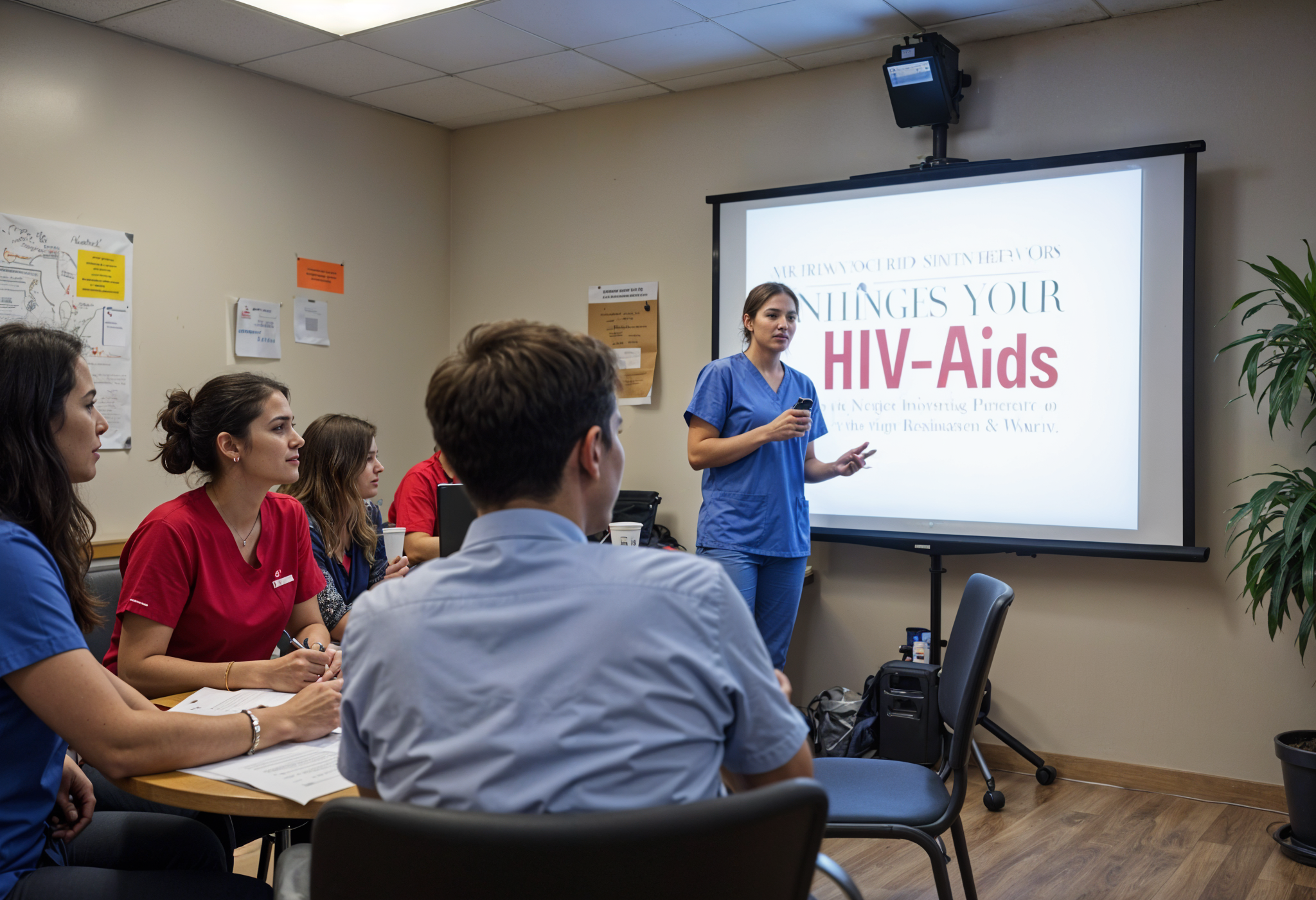Preventive measures of HIV : Guidelines for Nurses in US
Diverse healthcare workers promoting HIV/AIDS awareness
U.S. laws like the Americans with Disabilities Act protect HIV-positive individuals and healthcare workers from discrimination, ensuring a safe and inclusive workplace for all.
Nurses play a vital role in HIV prevention and treatment through tools like ART, PrEP, and PEP, while adhering to strict infection control protocols to ensure patient and staff safety.
Training programs, certifications, and support networks like ANAC and CDC resources empower foreign nurses to excel in HIV/AIDS care while adapting to U.S. healthcare standards.
December is HIV Awareness Month, a time to reflect on the ongoing fight against HIV/AIDS and to highlight the pivotal role healthcare workers play in prevention, treatment, and education. For foreign nurses joining the U.S. healthcare field, understanding the nation’s HIV/AIDS policies is essential. This guide provides an overview of relevant laws, workplace guidance, and clinical practices to help nurses acclimate effectively while contributing to HIV/AIDS care.
HIV/AIDS Overview in the U.S.
HIV/AIDS remains a critical public health issue in the U.S. Despite significant advancements in treatment, nearly 1.2 million people are living with HIV in the country. According to recent CDC data, approximately 13% of these individuals remain undiagnosed, underscoring the importance of robust screening and education efforts.
Regions with the highest prevalence include the South and urban centers, where healthcare disparities often hinder access to care. High-risk populations include men who have sex with men (MSM), transgender individuals, and racial/ethnic minorities, particularly African Americans and Hispanics.
Preventive measures of HIV: Role of Nurses
Nurses’ impact and involvement in HIV/AIDS care is very important. They are providing not only treatment but also emotional support and education. Foreign nurses bring diverse experiences that can enhance care quality, particularly in community outreach and culturally sensitive approaches. Their roles extend to advocating for patients, ensuring adherence to antiretroviral therapy (ART), and promoting prevention measures like PrEP (pre-exposure prophylaxis).
A document titled ‘National HIV/AIDS Strategy’ containing U.S. HIV/AIDS policy efforts
U.S. Government Framework for prevention of HIV and AIDS
The National HIV/AIDS Strategy (NHAS) 2025 serves as the cornerstone of the nation’s response to HIV. This strategy aims to:
Reduce new HIV infections by 75% by 2025 and by 90% by 2030.
Increase access to care for people living with HIV (PLWH).
Combat stigma and discrimination that hinder treatment and prevention efforts.
The NHAS aligns federal, state, and local efforts to address disparities in HIV care and prevention.
Federal Acts Supporting HIV/AIDS Care
Two key federal acts ensure the support and rights of individuals with HIV:
Ryan White HIV/AIDS Program:
This program provides funding to cities, states, and organizations to deliver high-quality care for uninsured or underinsured PLWH. It remains one of the most significant initiatives, benefiting over half a million Americans annually.
Americans with Disabilities Act (ADA):
The ADA prohibits discrimination against HIV-positive individuals in employment, healthcare, and other areas. For nurses, it ensures that PLWH are treated with dignity and without prejudice in all healthcare settings.
HIV Status and U.S. Immigration Policies
Until 2010, HIV-positive status was a barrier to entry into the U.S. Today, HIV is no longer grounds for inadmissibility, reflecting progress in both public health understanding and human rights. However, foreign nurses must still undergo a medical examination as part of the immigration process, which includes tests for communicable diseases like tuberculosis but not for HIV.
Preparing for U.S. Licensure as a Foreign Nurse
Foreign nurses seeking licensure in the U.S. should familiarize themselves with state-specific requirements, which often include:
Passing the NCLEX-RN (National Council Licensure Examination for Registered Nurses).
Meeting clinical and ethical standards, including knowledge of HIV-related care protocols.
Nurses are expected to uphold patient confidentiality and adhere to evidence-based practices, especially in sensitive areas like HIV/AIDS care.
Preventive measures of HIV: Anti-discrimination Laws in Healthcare
The U.S. enforces stringent laws to protect healthcare workers, including those living with HIV. Foreign nurses can benefit from the following protections:
Equal Employment Opportunity: The ADA and the Equal Employment Opportunity Commission (EEOC) safeguard nurses with HIV from workplace discrimination. Employers cannot refuse to hire or terminate a worker solely based on their HIV status.
Stigma-Free Environment: Healthcare facilities must actively foster an inclusive culture, promoting awareness and reducing stigma surrounding HIV/AIDS.
Employers are also responsible for providing reasonable accommodations, such as flexible work hours or reduced physical workloads, ensuring that HIV-positive nurses can perform their duties effectively.
Managing Confidentiality and Ethical Practices
Confidentiality is paramount in handling HIV-related information, both for healthcare workers and patients. Foreign nurses must adhere to the following ethical guidelines:
HIPAA Compliance: The Health Insurance Portability and Accountability Act (HIPAA) mandates strict privacy standards for medical information. Nurses should ensure that patient data, including HIV status, is securely stored and shared only when necessary.
Professional Boundaries: Nurses are ethically obligated to treat HIV-positive patients with respect and without bias, ensuring equal care quality.
Confidentiality applies to both patients and healthcare colleagues, fostering a respectful and professional workplace.
A nurse explaining HIV prevention with PrEP medication in a clinical setting, emphasizing patient education
Evidence-based Practices for HIV Treatment
Nurses are critical in implementing the latest clinical guidelines for HIV/AIDS care. These include:
Antiretroviral Therapy (ART): The cornerstone of HIV treatment, ART reduces viral loads to undetectable levels, preventing disease progression and transmission. Nurses play a vital role in educating patients about adherence to ART regimens.
Prevention Strategies: The use of PrEP (pre-exposure prophylaxis) and PEP (post-exposure prophylaxis) has revolutionized HIV prevention. Nurses should be well-versed in counseling high-risk individuals about these options.
Continued education on advancements, such as long-acting injectables and emerging therapies, ensures that nurses provide up-to-date care.
Infection Control Measures
Maintaining strict infection control practices is essential to protect both healthcare workers and patients. Key measures include:
Universal Precautions: Adhering to CDC guidelines for all patient interactions, such as using gloves, gowns, and masks when exposure to blood or bodily fluids is possible.
Post-Exposure Protocols: Immediate initiation of PEP after accidental exposure to HIV (e.g., needlestick injuries) can significantly reduce transmission risk. Nurses should report and address such incidents promptly.
Regular training and compliance with these measures ensure safe and effective care in any healthcare setting.
Training and Certification Opportunities
Foreign nurses seeking to specialize in HIV/AIDS care can access numerous resources:
HIV/AIDS Certification Programs: Organizations like the American Academy of HIV Medicine (AAHIVM) and the Association of Nurses in AIDS Care (ANAC) offer certifications and advanced training.
CDC Resources: The CDC provides free online courses, webinars, and publications tailored to HIV prevention and treatment practices.
Pursuing these certifications can enhance nurses’ credentials and equip them with the skills to manage complex HIV cases effectively.
Support Networks for Foreign Nurses
Integrating into a new healthcare system can be challenging, but several organizations offer support:
Professional Associations: Groups like the International Nurses Association provide mentorship, networking, and guidance for foreign nurses.
HIV Advocacy Groups: Local and national organizations, such as AIDS United and The Well Project, offer resources and community connections focused on HIV care.
Engaging with these networks helps nurses stay informed, build confidence, and develop meaningful professional relationships.
Foreign nurses participating in a mentorship program, learning about HIV/AIDS care strategies in a supportive environment.
Fostering Excellence and Inclusivity in HIV/AIDS Care
Understanding U.S. policies on HIV/AIDS is crucial for foreign nurses transitioning into the healthcare system. By familiarizing themselves with legal protections, workplace guidelines, and clinical best practices, nurses can ensure high-quality care for their patients while protecting their own rights.
Participating in professional development opportunities and support networks not only aids in acclimation but also empowers foreign nurses to contribute effectively to the global fight against HIV/AIDS. Together, we can build a healthcare system that upholds dignity, inclusivity, and excellence.
Connect with BridgeWay Expert
FAQs
What rights do HIV-positive nurses have under U.S. law?
Nurses with HIV are protected from workplace discrimination under the Americans with Disabilities Act (ADA) and related regulations.
What is PrEP, and how can nurses promote its use?
PrEP (pre-exposure prophylaxis) is a daily pill that reduces the risk of HIV infection. Nurses can educate high-risk populations on its benefits and usage.
Are there organizations that support foreign nurses working in HIV/AIDS care?
Yes, organizations like the Association of Nurses in AIDS Care (ANAC) and AIDS United provide resources, training, and advocacy opportunities.
How should foreign nurses handle HIV-related patient data?
Nurses must comply with HIPAA regulations, ensuring all HIV-related information is kept confidential and shared only with authorized personnel.
What are the latest advancements in HIV treatment?
Recent innovations include long-acting injectables and combination therapies that simplify HIV management. Nurses should pursue continuing education to stay updated.












